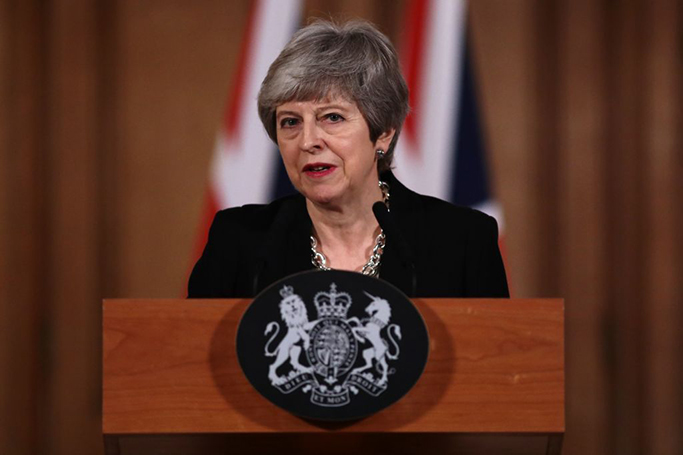LONDON, (Reuters) – Prime Minister Theresa May said yesterday she would seek another Brexit delay to agree an EU divorce deal with the opposition Labour leader, a last-ditch gambit to break an impasse over Britain’s departure that enraged many in her party.
Nearly three years since the United Kingdom voted to leave the European Union in a shock referendum result, it is still unclear how, when or if it will ever indeed quit the European club it first joined in 1973.
In a hastily arranged statement from her Downing Street office after spending seven hours chairing cabinet meetings on how to plot a way out of the Brexit maze, May said she was seeking another short extension to Brexit beyond April 12.
Her move offers the prospect of keeping the United Kingdom in a much closer economic relationship with the EU after Brexit – though it could also rip her Conservative Party apart as half her lawmakers want a decisive split from the bloc.
“I am offering to sit down with the leader of the opposition and to try to agree a plan – that we would both stick to – to ensure that we leave the European Union and that we do so with a deal,” she said.
“We will need a further extension of Article 50 (divorce notification), one that is as short as possible and which ends when we pass a deal. We need to be clear what such an extension is for – to ensure we leave in a timely and orderly way.”
Corbyn said he would be “very happy” to meet May and that he would set no limits ahead of the talks, while reiterating that his party aimed to keep a customs union with the EU, access for Britain to its single market and protections for workers.
He added that he would hold a vote of no-confidence in the government in reserve if any eventual accord still failed to achieve majority support in a deeply split British parliament.
Germany and France called for more clarity from London, warning that without a clear sense of what Britain wanted it could be heading towards a disorderly Brexit within days. The EU’s Donald Tusk called for patience with London.
Keeping Britain closely tied to the EU after Brexit is anathema to much of the Conservative Party. Many Brexit-backing Conservatives were livid at May over her overture to Corbyn.
“This is a deeply unsatisfactory approach, it is not in the interests of the country, it fails to deliver on the referendum result and history doesn’t bode well for it,” Jacob Rees-Mogg, a prominent Brexiteer, told reporters following a meeting of the party’s hardline eurosceptic parliamentary group.
Boris Johnson, the face of the 2016 Brexit campaign, said a compromise with Labour would betray the referendum, asserting that the world’s fifth biggest economy could be outside the EU but still subject to EU rules.
“Brexit is becoming soft to the point of disintegration,” said Johnson, who resigned as foreign minister last July. Still, May faced no immediate resignations from her senior team.
Prominent Brexit supporters in May’s cabinet, such as Michael Gove, defended her plan in public after a marathon meeting at which ministers haggled for hours over coffee and sandwiches. They finished with Chilean red wine.
Any plan, May said, would have to include the current Withdrawal Agreement that she agreed with the EU in November and which the bloc says it will not reopen.
May last week offered to quit if parliament approved her deal but lawmakers defeated it a third time on Friday, the very day Britain had been due to leave the EU. Brexiteers say her deal would trap Britain in the EU’s orbit indefinitely but pro-EU opposition parties say her proposed break would isolate Britain and cause lasting economic damage.
Lawmakers failed on Monday to find a majority of their own for any alternative plan ranging from a permanent customs union to a confirmatory referendum on any deal and a revocation of the divorce papers to avoid a no-deal crash-out.
NEW OPTIONS FOR PARLIAMENT?
May said that if she could not agree a unified approach with Corbyn, a veteran socialist who voted against joining the bloc in 1975, then the government would come up with a number of options on the future relationship with the EU.
Then, she said, the government would put them before the House of Commons in a series of votes.
“Crucially, the government stands ready to abide by the decision of the house,” May said.
Her move could cleave apart her Conservatives, who have been grappling with an internal schism over Europe for the past three decades. Over half of her lawmakers voted last week to go for a no-deal Brexit, much to the alarm of British business.
“It seems to me that she wants to rely upon Labour votes to get this extension through,” David Jones, a Brexit-supporting former Conservative minister, told Reuters. “If she does that, then she is putting the future of the party in peril.”
May said she wanted the Withdrawal Agreement Bill to be passed before May 22 so that the United Kingdom did not have to take part in elections that month to the European Parliament.
Her spokesman said it was possible to cancel participation in the European elections right up to the day of the vote.
The impasse has already delayed Brexit for at least two weeks beyond the planned departure date of March 29 to 2200 GMT on April 12.
“This is a decisive moment in the story of these islands,” May said. “But we can and must find the compromises that will deliver what the British people voted for.”









